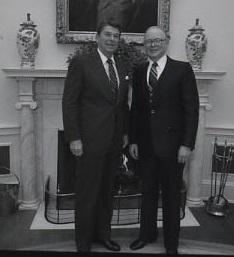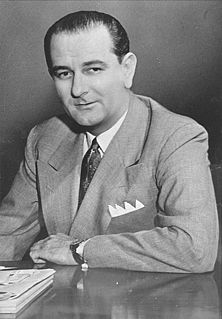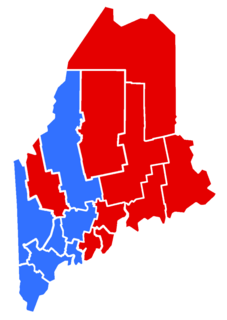Maine gubernatorial election, 1960
|
|
|
 County results Counties won by Coffin Counties won by Reed |
|
The 1960 Maine gubernatorial election was a special election held to officially elect a governor following the death of Governor Clinton Clauson. It took place on November 8, 1960 with Republican Governor John Reed (who, as Maine Senate President, automatically took office upon Clauson's death) defeating Democrat Frank M. Coffin.
Clinton Amos Clauson was a Democratic Party politician and the 66th Governor of Maine. Clauson died while in office, having served as governor for just under a year.

The Republican Party, also referred to as the GOP, is one of the two major political parties in the United States; the other is its historic rival, the Democratic Party.

John Hathaway Reed was the 67th Governor of Maine, holding office during the 1960s. He was once an Aroostook County potato farmer. Reed was a Republican who took office following the death of Governor Clinton Clauson.
The election was also the first time since Maine was admitted to the Union that the state did not hold its election in September. Traditionally, Maine had held its elections two months before the rest of the nation, which had help give birth to the phrase "As Maine goes, so goes the nation" and its status as a bellwether state. However, following a 1957 referendum, the state constitution was amended to hold all elections after 1958 in November.

The United States of America (USA), commonly known as the United States or America, is a country comprising 50 states, a federal district, five major self-governing territories, and various possessions. At 3.8 million square miles, the United States is the world's third or fourth largest country by total area and is slightly smaller than the entire continent of Europe's 3.9 million square miles. With a population of over 327 million people, the U.S. is the third most populous country. The capital is Washington, D.C., and the largest city by population is New York City. Forty-eight states and the capital's federal district are contiguous in North America between Canada and Mexico. The State of Alaska is in the northwest corner of North America, bordered by Canada to the east and across the Bering Strait from Russia to the west. The State of Hawaii is an archipelago in the mid-Pacific Ocean. The U.S. territories are scattered about the Pacific Ocean and the Caribbean Sea, stretching across nine official time zones. The extremely diverse geography, climate, and wildlife of the United States make it one of the world's 17 megadiverse countries.
"As Maine goes, so goes the nation" is a phrase that at one time was in wide currency in United States politics. The phrase described Maine's reputation as a bellwether state for presidential elections. Specifically, Maine's September election of a governor predicted the party outcome of the November presidential election in 19 out of the 26 presidential election years from 1832 to 1932, or 73 percent of the time. The accurate years were from 1832 through 1844, in 1852, from 1860 through 1876, in 1888, from 1896 through 1908 and from 1920 through 1932.
A bellwether is one that leads or indicates trends; a trendsetter.

The United States presidential election of 1936 was the thirty-eighth quadrennial presidential election, held on Tuesday, November 3, 1936. In the midst of the Great Depression, incumbent Democratic President Franklin D. Roosevelt defeated Republican Governor Alf Landon of Kansas. Roosevelt won the highest share of the popular and electoral vote since the largely uncontested 1820 election. The sweeping victory consolidated the New Deal Coalition in control of the Fifth Party System.

The Maine Legislature is the state legislature of the U.S. state of Maine. It is a bicameral body composed of the lower house Maine House of Representatives and the upper house Maine Senate. The Legislature convenes at the State House in Augusta, where it has met since 1832.

The 1978 United States Senate elections in the middle of Democratic President Jimmy Carter's term. Thirteen seats changed hands between parties. The Democrats at first lost a net of two seats to the Republicans, and then one more in a special election. Democrats nevertheless retained a 58-41 majority.

The 1954 United States Senate elections was a midterm election in the first term of Dwight D. Eisenhower's presidency. Eisenhower's Republican party lost a net of two seats to the Democratic opposition. This small change was just enough to give Democrats control of the chamber with the support of an Independent who caucused with them.

The Literary Digest was an influential American general interest weekly magazine published by Funk & Wagnalls. Founded by Isaac Kaufmann Funk in 1890, it eventually merged with two similar weekly magazines, Public Opinion and Current Opinion.
The Republican Party of Pennsylvania, commonly known as the PA GOP, is based in Harrisburg in the United States state of Pennsylvania. It is affiliated with the Republican Party of the United States.
Robert N. Haskell was a Maine state senator and the 65th Governor of Maine for five days in 1959.

The 2010 United States elections were held on Tuesday, November 2, 2010, in the middle of Democratic President Barack Obama's first term. During this midterm election year, all 435 seats in the United States House of Representatives and 37 of the 100 seats in the United States Senate were contested, along with 39 state and territorial governorships, 46 state legislatures, four territorial legislatures and numerous state and local offices. Approximately 82.5 million people voted.

The 2011 United States elections were held on Tuesday, November 8. This was an off-year election, in which the only seats up for election in the United States Congress were special elections. There were also four gubernatorial races, including a special election in West Virginia. There were also state legislative elections in four states and judicial elections in three states; as well as numerous citizen initiatives, mayoral races, and a variety of other local offices on the ballot.

The 1966 Maine gubernatorial election took place on November 1, 1966. Incumbent Republican Governor John Reed, had been elected to finish the term of Clinton Clauson in 1960, was then re-elected in 1962 and became the state's first four-year Governor. Reed was seeking a second full four-year term, and was challenged by Democrat Kenneth M. Curtis. Curtis defeated Reed, beginning a twenty-year period of Republican isolation from the Blaine House.

The 1962 Maine gubernatorial election took place on November 6, 1962. Incumbent Republican Governor John Reed, had been elected in 1960 in a special election to finish the final two years of Clinton Clauson's term following his death, and was seeking a full term of his own. He faced off against Democratic challenger Maynard C. Dolloff. Reed was re-elected by one of the narrowest margins in Maine history – a mere 483 votes.
As of 2018, this is the last Maine gubernatorial election in which the Republican candidate won over 50% of the vote.

The 1958 Maine gubernatorial election took place on September 8, 1958. Incumbent Democratic Governor Edmund Muskie, was term limited and seeking election to the United States Senate, thus did not run. Democrat Clinton Clauson, then mayor of Waterville, unexpectedly defeated Muskie's chosen Democratic candidate in the primary, and faced off against the popular previous two term Republican Governor, Horace Hildreth in the general election. Hildreth was the heavy favorite to win, however Clauson was able to narrowly defeat him, retaining the Blaine House for the Democrats.

In the United States, 45 of the 50 states have an office of lieutenant governor. In two of the 45 states, the speaker of the upper house of the state legislature serves in such a capacity. In most cases, the lieutenant governor is the highest officer of state after the governor, standing in for that officer when they are absent from the state or temporarily incapacitated. In the event a governor dies, resigns or is removed from office, the lieutenant governor typically becomes governor.
Some type of election in Connecticut occurs annually in each of the state’s cities and towns, the exact type of which is dependent on the year. Elections for federal and statewide offices occur in even-numbered years, while municipal elections occur in odd-numbered ones.

The 2020 United States elections will be held on Tuesday, November 3, 2020. All 435 seats in the United States House of Representatives, 34 of the 100 seats in the United States Senate, and the office of President of the United States will be contested. Thirteen state and territorial governorships, as well as numerous other state and local elections, will also be contested.

United States gubernatorial elections were held on 8 November 1960, in 27 states concurrent with the House, Senate elections and presidential election.
















